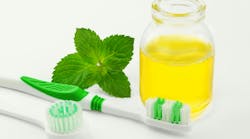Even if you’re new to dentistry, you’ve likely heard about oil pulling. Is it a craze? Maybe. Is it a natural alternative? Yes. Does it work? Depends on what you use it for.
Oil pulling dates back about 3,000–5,000 years as a medicinal therapy used in the holistic medical practice of Ayurveda in India.1 In 2014, DentistryIQ ran an article about oil pulling, and it stayed in the top clicked articles for many years. Now, oil pulling is back on the scene.
In late 2022, researchers looked at scientific articles from PubMed, the Cochrane Library, and the EMBASE database to survey the effects of oil pulling on salivary bacterial count, plaque index, and gingival index. They found that oil pulling significantly reduced salivary bacterial colony counts, but plaque and gingival indexes were not significantly different between the oil pulling group and the control group.2
In 2024, a study compared oil pulling to chlorhexidine and other mouthwashes. Researchers concluded a “probable benefit of oil pulling in improving gingival health.” Oil pulling fared better in improving modified gingival index scores when compared to non-chlorhexidine mouthwashes, but chlorhexidine was more effective in reducing plaque index scores.3
There seem to be as many questions as answers about the practice of oil pulling, but here are some recently published articles from DentistryIQ, RDH, and Dental Economics that may help you in your quest for more information.
Oil pulling literature review
Despite limited statistically significant evidence on the oral health benefits of oil pulling, studies have outlined its potential therapeutic effects and how it could be pivotal when oral hygiene resources are minimal. Annie Walters, MS, RDH, takes a deep dive into the science.
A look at the most current research
Coconut oil as an adjunct oral therapy
Two student hygienists from Pacific University School of Dental Hygiene Studies—Rose Nguyen, BSDH(c), and Lisa Ng, BSDH(c)—investigated whether there’s evidence of the benefits of coconut oil pulling. Here is their analysis of the literature.
Is there enough evidence for oil pulling?
Coconut oil to alleviate dry mouth symptoms
Reduced salivary flow can lead to a host of oral health issues. Amanda Hale, BS, RDH, recommends coconut oil pulling as an adjunct to treatment plans for patients who suffer from xerostomia. Learn more about how oil pulling can help alleviate symptoms of dry mouth.
Oil pulling for disease prevention
Jacqueline Carcaramo, BSDH, RDH, says the ancient discipline of Ayurveda allows one to create daily habits that benefit physical and mental health (including oral health). In Ayurveda, oil pulling is thought to be a contributing factor in the prevention of diseases.
3 Ayurvedic rituals for health
Coconut oil and turmeric to whiten teeth?
Diana Zardouz, DDS, writes about some trends patients are trying at home to whiten their teeth—and cautions them. Among these practices are oil pulling, scrubbing teeth with acidic foods, and charcoal toothpaste with baking soda.
There is still uncertainty about the effectiveness of oil pulling and how it may fit into traditional dental care. Further studies are needed.
References
- Naseem M, Khiyani MF, Nauman H, Zafar MS, Shah AH, Khalil HS. Oil pulling and importance of traditional medicine in oral health maintenance. Int J Health Sci (Qassim). 2017;11(4):65-70.
- Peng TR, Chen HY, Wu TW, Ng BK. Effectiveness of oil pulling for improving oral health: a meta-analysis. Healthcare (Basel). 2022;10(10):1991. doi:10.3390/healthcare10101991
- Jong FJX, Ooi DJ, Teoh SL. The effect of oil pulling in comparison with chlorhexidine and other mouthwash interventions in promoting oral health: a systematic review and meta-analysis. Int J Dent Hyg. 2024;22(1):78-94. doi:10.1111/idh.12725







